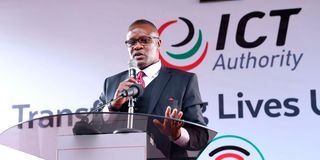State to establish 1,450 village digital hubs, 25,000 WiFi hotspots nationwide

Information, Communication and Digital Economy Cabinet Secretary Eliud Owalo.
President William Ruto’s administration has rolled out a host of digital infrastructure programmes across the country as it seeks to make all government services available online.
The Information and Communication Technology (ICT) Ministry under Cabinet Secretary Eliud Owalo said plans are underway to establish 1,450 village digital hubs on top of installing 25,000 WiFi hotspots across the country.
Upto 61 WiFi hotspots have since been installed in various parts of the country with the ministry planning to have at least two hotspots per county by end of June.
Further, digital skills labs have been established in 17 Technical and Vocational Education and Training (TVETs) and are ready for commissioning.
Also in the pipeline is the plan to roll out 100,000 KMs of High-Speed Fiber Optic Infrastructure. The programme has since been approved by the Cabinet. The ministry is already engaging private sector stakeholders to discuss the details of their involvement.
“Negotiations now going on, on the fund to the tune of $500 million (Sh62.5 billion) under the World Bank’s Digital Economy Moonshot Project, to support Kenya’s digital transformation, through the Kenya Digital Economy Acceleration Programme (KDEAP),” Mr Owalo told Nation.Africa.
Under Ajira programme, a total of 73, 000 youth have been trained between July and December 2022 in TVETs, Universities and Youth Empowerment Centres.
The government has also established 240 Constituency Innovation Hubs (CIHs) since November last year. The objective of the project is to support entrepreneurs and access to free Wi-Fi in all the 290 constituencies countrywide.
It will also enhance awareness and uptake of online platforms for employment and business opportunities.
This is even as the government announced plans to digitise a total of 5,000 government services.
The government has since taken full charge of the E-Citizen platform, having placed on board a total of 1,200 services. Additional 30 services are being made available on the platform daily.
The rush to implement the programme comes barely a month after President Ruto promised to digitise and make all government services available online. He noted that making government services available online would ease and enhance service delivery.
“To ensure that Kenyans are getting better government services, we will ensure that 5,000 government services are accessible online in six months. This will help solve the issue of Kenyans making very long queues to be served,” said the President in December.
CS Owalo said that his Ministry is currently benchmarking with Estonia, India and Pakistan to realise the national digital identity in the next 12 months.
The ministry also intends to launch a national call centre.
“Konza Technopolis has the facility and capacity to operationalise a national call centre linked to various ministries, departments, and agencies to enable citizens to interact with the government on issues of interest or concern. Plans at an advanced stage to launch the centre. The call centre can be equipped with call logging, escalation and switching to relevant government entities for action,” said the CS.





